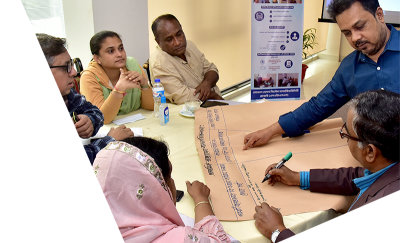Webinar Takeaways:
Our illustrious panel underscored the many ways in which state and local governments, non-governmental organizations, donors, and donor-funded programs have made practical gains toward sustainable integration of health services; equitable, expanded access to said services; and political will for achieving universal health coverage (UHC) in Nigeria. The conversation also delved into how other countries can adapt successful approaches in Nigeria toward their own UHC progress.
Key takeaways are below.
Universal Health Coverage (UHC)
- Community-based approaches are critical to tackling coverage expansion: Both Kano and Lagos states have prioritized community-driven approaches to identify and connect vulnerable populations—including those with HIV/AIDS, sickle cell disease, orphans, and the elderly—to health services, ensuring equitable access to care. Health insurance and equity funds have been critical mechanisms for enabling access to care.
- Equity Funds for Vulnerable Populations: Kano and Lagos allocate a small percentage of the state budget to support the enrollment and care of vulnerable populations, enabling continued and sustainable access to healthcare for those most in need and/or readily lost to follow-up.
HIV Service Integration into Primary Health Care
- HIV Services Integration: Both Kano and Lagos have successfully integrated HIV treatment and care into primary health services, making it easier for people to access essential services such as antenatal care, surgeries, and laboratory tests. In Lagos, integration also extends to HIV testing. For example, LASHMA incentivizes hospitals to conduct HIV testing by paying service charges at the point of testing, ensuring greater utilization and improved referral networks for HIV-positive patients.
- Collaboration with Partners: State and local partnerships with donors like USAID and implementing partners like Abt allow for focused transition away from verticalized services so that essential health services for people living with HIV (PLHIV) are incorporated into health insurance plans. Doing so facilitates referrals and continuity of care across health care needs. This continues to be a lens through which governments, donors, and non-governmental organizations need to work together to connect population needs with available resources and mechanisms for access to care.
Sustainability
- Public Financial System Reform: In Kano, gaps in public financial management have been identified and addressed through donor-funded technical assistance, including the USAID Local Health Systems Sustainability Program led by Abt. This includes working with the government based on their identified needs to improve resource allocation, operational efficiency, and the overall sustainability of health financing.
- Community Mobilization and Education: Both Kano and Lagos focus on engaging local communities and field officers to increase awareness and educate citizens about the benefits of health insurance and drive enrollment into health programs. Doing this at the community level enables continuity and follow-up based on community members’ understanding of health service demands and people’s concerns around enrollment. Reducing financial barriers has played an important role in successful mobilization and enrollment into health insurance schemes.
- Long-Term Sustainability: Despite progress, challenges including financial, logistical, and sociocultural barriers, remain. State and local efforts to overcome these challenges include providing employment and skill-building for vulnerable populations to ensure they can afford premiums in the future.
Lessons Learned toward UHC
- Political Will and Public Education: Political commitment is crucial for achieving UHC with a focus on strong planning and public awareness campaigns to build widespread government support, financing, and prioritization.
- Effective Use of Technology and Data: Both health insurance enrollment and access to health services can be boosted through technology. In Kano, for example, LASHMA has invested in national ID verification systems and virtual booths to enhance transparency, accountability, and accessibility.
- Community Engagement: Involving local communities in the design and delivery of health programs is critical to ensuring that services align with the socio-cultural values of the populations they seek to serve. Engaging community actors in providing the information, services, and follow-up reinforces this.
Opportunities for the Future
- Expansion of Health Coverage: Both Kano and Lagos are focused on expanding health insurance schemes to cover more vulnerable populations and informal sector workers. Increasing public awareness, especially at the local level, will be critical to achieving higher enrollment and broader coverage.
- Further Integration of HIV Services: There are opportunities to continue expanding the integration of HIV services into broader health insurance programs, improving accessibility and continuity of care for those living with HIV.
- Leveraging Local Partnerships: Future opportunities lie in strengthening partnerships with local governments, community-based organizations, and the private and informal sectors to mobilize resources, enhance healthcare delivery and quality, and expand UHC efforts.
Webinar Description:
In the past decade, Nigeria has made progress mobilizing domestic resources and advancing financial protections for all, including vulnerable populations and those living with HIV, through decentralized government approaches to expanding primary health care (PHC). Panelists will discuss key state and local government-driven strategies and successes that enabled adoption of health insurance and service integration. Supported by the Abt-led USAID Local Health System Sustainability (LHSS) project, these approaches have expanded access to integrated health care in five states.
From Lagos to Kano, learn more about how government partnerships, the Basic Health Care Provision Fund, other government-driven initiatives, and the latest health sector reforms are equipping Nigeria to build an inclusive, resilient, and sustainable health system that provides essential services for all while offering a replicable blueprint for other nations pursuing sustainable universal health coverage (UHC).
Moderator: Kelly Saldana, Vice President, Global Health, Abt Global
Speakers:
- Dr. Bolanle Olusola-Faleye, Chief of Party, USAID Local Health System Sustainability (LHSS) Nigeria Program, Abt Global
- Dr. Gafar Alawode, Co-Convenor, Nigeria UHC Forum and Managing Partner at Development Governance International Consult Ltd.
- Dr. Usman Bashir, Director General, Kano State Agency for the Control of AIDS (KSACA)
- Dr. Olugbenga Fadipe, Head of the ILERA EKO Medical Team, Lagos State Health Management Agency



